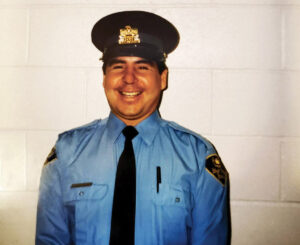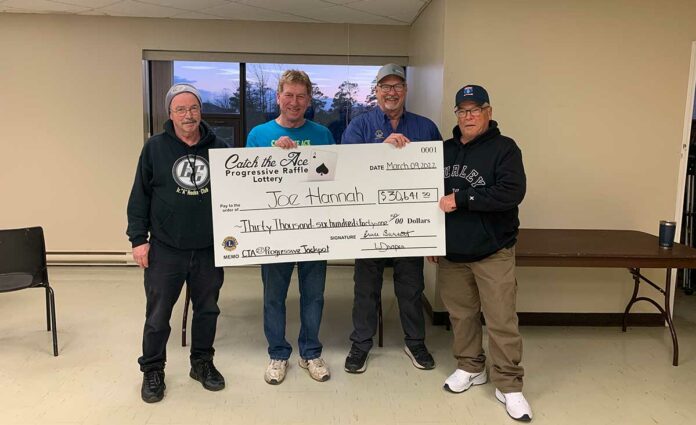by Tom Sasvari
M’CHIGEENG—April 3 marked the end of a long career in policing for Aundeck Omni Kaning First Nation’s Max Abotossaway. Senior Constable and court officer Abotossaway served 30 years with UCCM Anishinaabe Police Service (UCCM APS).
“He was passionate about his policing career and served with integrity and humility and was truly dedicated to servicing the UCCM First Nations,” said James Killeen, chief of police for UCCM APS.
Constable Abotossaway was born in Sault Ste. Marie. “My parents moved here from the Sault when I was four years old,” he said. “We moved to Sucker Creek where we lived in my grandfather’s place.”
He went to school in Little Current and then to Manitoulin Secondary School in M’Chigeeng. When he was 14 years old, he worked in home construction and then did marina work at Ferguson Marine. When he was 16, he worked at Harbor Vue Marina as a mechanic.
He took mechanical engineering in college and was going to Lakehead University in Thunder Bay for an engineering degree. He didn’t quite finish his schooling but always intended to go back.
“I never really think about it, but it has been a long time,” Constable Abotossaway told The Expositor.
Prior to becoming a police officer, Mr. Abotossaway worked with both the Ministry of the Environment and the Ministry of Labour. He was hired in 1990 and started in Sault Ste. Marie, where he was a front-line officer. He transferred to Sudbury with the Ministry of Labour, working to enforce Occupational Health and Safety Act violations.
“Bev (his wife) and I were living in Sudbury when I applied for the job with the police,” said Constable Abotossaway. “Bev and I had plans to stay permanently in Sudbury. I had a career in the field, but I applied for the job and the next thing I knew, I was going for an interview and testing, in the old OPP building in Brampton.”
Back in 1992, Constable Abotossaway was about to move to Sudbury, when he saw a recruitment advertisement for the Ontario Provincial Police College. He graduated that year alongside colleagues Sergeant Heather Debassige and Staff Sergeant Brad Mack.

There were more than 50 recruits there, all First Nations. “We were there for a couple of weeks for physical fitness and police orientation,” Constable Abotossaway.
After that training, “They put us on the road,” he said. “Basically, we had taken a crash course in policing and pistol training. I had my first gun call before I had gone through police college.”
“It was all an eye opener,” he added. “I made a lot of friends, all brand new to me. One guy was from Port Severn, but most were from the more northerly part of Ontario. Some of the guys had pretty good stories of shooting polar bears in the north, for example. We were like city slickers.”
Constable Abotossaway and his colleagues started work at what was at the time West Bay Police, under the First Nation policing program.
“I remember in the early days going out on calls with members of the OPP (Ontario Provincial Police),” he said. “We weren’t really a standalone police detachment unit until we formed the UCCM (APS), then we became the lead in our communities.”
That was two or three years into his policing career.
“We had to go through third class, then second class and first class and then constables,” he noted. “We had senior constables in those days when we were with the OPP.”
Over the years the West Bay Police were renting space in the M’Chigeeng complex building, but there was no room. Constable Abotossaway remembered they couldn’t all park in the parking lot for a police commission meeting and had to park across the street from the office. The police service had an office on one side of the (then) new post office and the constables in another unit.
They started hiring other officers, like Murray Still and Dave Mack, who were policing in southern Ontario prior to that.
“Over the years, one big change is the size we’ve grown to as a police detachment,” said Constable Abotossaway. The other is working on a computer system. He recalled looking through binders for information and handwriting reports.
“There has always been something new with this job,” he said. “You never knew what was going to happen. It’s been a challenge to do a lot of things. I come from a background in engineering and like to figure out things on the fly.”
“It’s been up and down all the way through my career,” said Constable Abotossaway. “Some guys would ride with me and ask, ‘What is going to happen since I’m riding with you?’ That’s been my career: whatever can happen, will happen.”
For the last three years he’s been the court officer, which has allowed him to decompress somewhat.
“I couldn’t be retiring any sooner. It’s getting a little dangerous out there,” he said. “Overall, the numbers of cases we get calls on are the same and it’s still safe, but things have changed.”
As for what he is going to do in retirement, “I don’t know at this time,” Constable Abotossaway said. “I will be able to spend more time with my family.”
“Max worked the frontline for the majority of his career until 2019, when he took the court officer position with the goal of somewhat normalizing his remaining years as an officer by working regular work hours away from the frontline. He did this while maintaining his first class constable, scene of crime officer and breathalyzer qualifications” said Chief of Police Killeen.
“His colleagues acknowledged the words of wisdom he often shared over coffee, his profound knowledge of all things movies, news, television, physics, mathematics, history and most notably, his humour,” said Chief of Police Killeen. “We hope that Max enjoys his retirement, while spending more time with his wife Beverly, his sons Gabriel and Wesley (fiancé Jade), and his grandchildren Griffin and Renan.”
Chief of Police Killeen added, “On behalf of the UCCM Police Commission, UCCM Police officers and staff, and the UCCM First Nations, congratulations to Senior Constable Maxwell Abotossaway for a job well done! If you see Max out and about, please wish him well and help me thank him for his 30 years of policing service.”





